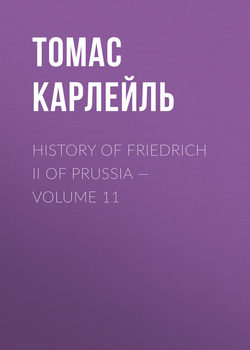Читать книгу History of Friedrich II of Prussia — Volume 11 - Томас Карлейль - Страница 3
BOOK XI. — FRIEDRICH TAKES THE REINS IN HAND. — June-December, 1740 Chapter I. — PHENOMENA OF FRIEDRICH'S ACCESSION ABOLITION OF LEGAL TORTURE
ОглавлениеFriedrich makes haste, next, to strike into Law-improvements. It is but the morrow after this of the Corn-magazines, by KABINETS-ORDRE (Act of Parliament such as they can have in that Country, where the Three Estates sit all under one Three-cornered Hat, and the debates are kept silent, and only the upshot of them, more or less faithfully, is made public),—by Cabinet Order, 3d June, 1740, he abolishes the use of Torture in Criminal Trials. [Preuss, Friedrichs Jugend und Thronbesteigung (Berlin, 1840,—a minor Book of Preuss's), p. 340. Rodenbeck, i. 14 ("3d June").] Legal Torture, "Question" as they mildly call it, is at an end from this date. Not in any Prussian Court shall a "question" try for answer again by that savage method. The use of Torture had, I believe, fallen rather obsolete in Prussia; but now the very threat of it shall vanish,—the threat of it, as we may remember, had reached Friedrich himself, at one time. Three or four years ago, it is farther said, a dark murder happened in Berlin: Man killed one night in the open streets; murderer discoverable by no method,—unless he were a certain CANDIDATUS of Divinity to whom some trace of evidence pointed, but who sorrowfully persisted in absolute and total denial. This poor Candidatus had been threatened with the rack; and would most likely have at length got it, had not the real murderer been discovered,—much to the discredit of the rack in Berlin. This Candidatus was only threatened; nor do I know when the last actual instance in Prussia was; but in enlightened France, and most other countries, there was as yet no scruple upon it. Barbier, the Diarist at Paris, some time after this, tells us of a gang of thieves there, who were regularly put to the torture; and "they blabbed too, ILS ONT JASE," says Barbier with official jocosity. [Barbier, Journal Historique du Regne de Louis XV. (Paris, 1849), ii. 338 (date "Dec. 1742").]
Friedrich's Cabinet Order, we need not say, was greeted everywhere, at home and abroad, by three rounds of applause;—in which surely all of us still join; though the PER CONTRA also is becoming visible to some of us, and our enthusiasm grows less complete than formerly. This was Friedrich's first step in Law-Reform, done on his fourth day of Kingship. A long career in that kind lies ahead of him; in reform of Law, civil as well as criminal, his efforts ended with life only. For his love of Justice was really great; and the mendacities and wiggeries, attached to such a necessary of life as Law, found no favor from him at any time.
